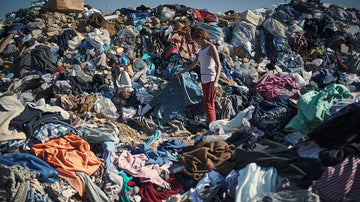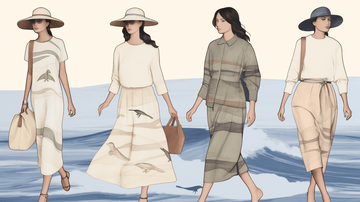The Impact of Choosing Quality Over Quantity When Building Your Wardrobe
by Lana Sands on Feb 19, 2024

In the world of fashion, the age-old adage "quality over quantity" holds more significance than ever, especially in the context of sustainability. Opting for timeless, well-crafted pieces instead of mass-produced, disposable fashion items not only benefits the environment but also has a considerable impact on the economy. Let's delve into why individuals should prioritize quality over quantity and explore the ripple effects on both a personal and global scale.
1. Environmental Impact:
-
Reduced Waste: Fast fashion's reliance on cheap materials and rapid production contributes to a staggering amount of textile waste. Choosing quality pieces means investing in items designed to withstand time, reducing the need for constant replacements and, subsequently, lowering the environmental footprint.
-
Resource Conservation: High-quality garments often use superior materials that require fewer resources in their production. Sustainable fabrics and ethical manufacturing processes contribute to preserving ecosystems and conserving precious resources.
2. Economic Implications:
-
Supporting Sustainable Practices: By investing in quality, sustainably produced clothing, consumers actively support businesses that adhere to ethical and environmentally friendly practices. This, in turn, encourages a shift in the industry towards more responsible manufacturing.
-
Job Creation and Fair Wages: Brands committed to quality often prioritize fair labor practices. Choosing such brands contributes to the creation of job opportunities and ensures that workers throughout the supply chain are paid fair wages.
3. Longevity and Cost-Effectiveness:
-
Longer Lifespan: High-quality garments are designed to endure both stylistic trends and the wear and tear of daily life. Choosing durable pieces means less frequent replacement, ultimately saving money over time.
-
Economic Efficiency: While the initial investment in quality items might be higher, the long-term economic efficiency becomes evident as these pieces outlast and outperform their cheaper, lower-quality counterparts.
4. Cultivating a Mindful Consumer Culture:
-
Shift in Consumer Mindset: Prioritizing quality over quantity encourages a shift towards mindful consumerism. It promotes the idea that each purchase is a conscious decision with lasting implications, fostering a more responsible and sustainable approach to fashion.
-
Reduced Impulse Buying: Investing in quality items encourages consumers to carefully consider their purchases, reducing impulse buying and contributing to a more intentional and thoughtful wardrobe.
The choice between quality and quantity in one's wardrobe extends beyond personal style preferences. It's a decision that holds the power to positively impact the environment, support ethical business practices, and foster a more sustainable and mindful global economy. By recognizing the long-term value of quality pieces, individuals can contribute to a healthier planet and a more resilient economic landscape.


